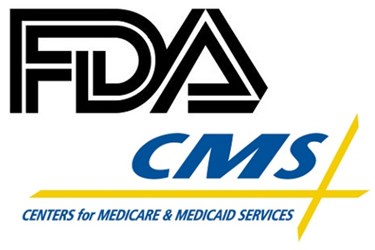FDA, CMS Form Task Force On Lab Developed Test (LDT) Regulation
By Jof Enriquez,
Follow me on Twitter @jofenriq

The U.S. Food and Drug Administration (FDA) and the Centers for Medicare and Medicaid Services (CMS) recently announced the creation of a task force to ensure that efforts in regulating laboratory developed tests (LDTs) will not be duplicative. The announcement comes amid confusion among industry stakeholders over seemingly overlapping functions by the two agencies over LDT regulation.
The task force will implement the LDT framework outlined in the FDA Notification and Medical Device Reporting for Laboratory Developed Tests draft guidance issued by the FDA in October 2014. Under the proposed framework, the FDA would phase in enforcement of premarket review requirements and the quality system regulation for some LDTs.
The FDA will be responsible for determining if tests are both analytically valid (able to accurately detect analytes) and clinically valid (able to measure or detect the clinical condition for which the test is intended), according to an FDA blog post. CMS, under the Clinical Laboratory Improvement Amendments (CLIA), would not check the validity of the tests themselves. Instead, CMS will regulate laboratories’ processes, quality operations, and staffing credentials.
The task force will identify similarities between both agencies’ regulatory requirements and will make them clearer and more consistent, including use of uniform terminologies. Pooling and efficient use of resources is also a priority. In addition, the task force will provide education and outreach to stakeholders seeking clarification.
The FDA’s decision to begin regulating medical laboratory testing — including companion diagnostics and laboratory developed tests (LDTs) — has been met with mixed response from industry stakeholders.
The American Clinical Laboratory Association (ACLA) had expressed concern that FDA regulation is redundant to existing requirements, could thwart diagnostic innovation, and will limit patient access to timely and effective treatments.
“Laboratories have been regulated for decades by the Centers for Medicare and Medicaid Services (CMS) under the Clinical Laboratory Improvement Amendments (CLIA) and by state law,” Alan Mertz, president of ACLA, said in a statement. “Under the CLIA framework, a thorough and detailed regulatory process, we’ve seen an explosion of innovation in laboratory diagnostics that has allowed labs to diagnose and measure disease with an accuracy and precision never before possible. This has changed how the medical world views and treats everything from rare diseases to infectious disease to cancer.”
The FDA has defended its decision to regulate LDTs, saying it needs to protect the public by ensuring all lab tests are valid, especially because LDTs have become more prevalent in the age of personalized medicine. According to a previous FDA statement, many LDTs are not supported by clinical studies but are competing with FDA-approved tests.
“Ensuring that doctors and patients have access to safe, accurate and reliable diagnostic tests to help guide treatment decisions is a priority for the FDA,” said former FDA commissioner Margaret A. Hamburg, M.D., in the statement. “Inaccurate test results could cause patients to seek unnecessary treatment or delay and sometimes forgo treatment altogether. Today’s action demonstrates the agency’s commitment to personalized medicine, which depends on accurate and reliable tests to get the right treatment to the right patient.”
Industry association AdvaMedDx has supported increased FDA oversight over LDTs. “The current diagnostics oversight paradigm results in a tremendous public health gap and highly disparate treatment of tests that are the same from the perspective of patient risk and safety, simply on the basis of where they are developed,” AdvaMedDx executive director Andrew Fish said in testimony before Congress last year. “This is bad public policy, provides an opportunity to use tests in clinical settings that have insufficient clinical data, and stifles investment in high quality products that are assured safe and effective for patients.
